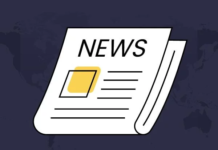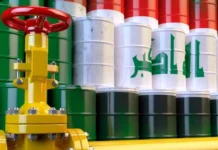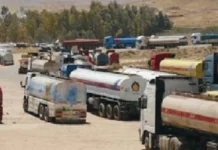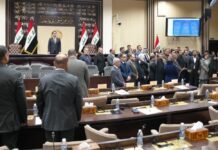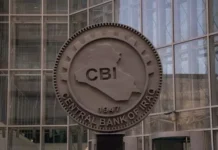Tishwash: JPMorgan Bank will lend Iraq $257 million
Iraqi Finance Minister said an agreement has been signed with JPMorgan Bank to finance projects to repair Iraqi power plants. “This will increase electricity generation,” he said.
An agreement has been signed with JPMorgan Bank to finance the repair and reconstruction of several power plant projects in Iraq, Finance Minister Taif Sami told the Iraqi News Agency on Tuesday.
He said the bank has provided $257 million in loans to Iraq to increase electricity generation and supply electricity to Iraqi regions.
“The level of electricity production in Iraq is 23,000 MW, while we need 35,000 MW to supply electricity to the whole of Iraq, and this project will reduce part of the energy shortage,” he said.”
Some experts said the signing of the agreement with JPMorgan Bank will have a positive impact on various sectors of manufacturing, services and development, while helping to increase the level of investment in Iraqi sectors .
https://nrttv.com/detail/31363
**************
Tishwash: this is from pakistan news
Unshackling the Iraqi dinar
On January 1, 2024, Iraq will ban all transactions involving the US dollar. The primary objective behind this decision is to wrest control over a fluctuating black market exchange rate and bolster the utilisation of the Iraqi dinar. The catalyst for this transformation has been an extended bout of currency instability, culminating in escalating prices and waves of civil unrest over the past half-year. The dinar’s precarious trajectory has been further exacerbated since November 2022, largely attributed to stringent US regulations governing international money transfers.
These measures stem from deliberations in Washington regarding the diversion of US dollars to Iran, Syria and Lebanon via Iraq’s Central Bank foreign currency auction. This strategic transition raises pertinent questions about the future standing of the US dollar as the predominant global reserve currency, hinting at the dawn of a more multipolar world order.
Iraq’s historical attachment to the US dollar for international dealings, reserve holdings and oil trading has been a longstanding tradition, but it comes with its set of complications. Iraq possesses over $100 billion in reserves parked in US banks, rendering it highly dependent on US officials’ goodwill to avert economic catastrophe.
Since 2003, all revenues from Iraqi oil have been channeled into an account under the purview of the US Federal Reserve, effectively granting Washington a lever to influence Iraq’s economic landscape and exert political pressure. Furthermore, the capricious nature of the US dollar, combined with shifts in US fiscal policies and economic sanctions, has rendered Iraq susceptible to considerable financial vulnerabilities, eroding its monetary sovereignty and obstructing the pursuit of economic diversification.
Iraq’s shift towards de-dollarisation holds promise on multiple fronts. Firstly, diversifying currency reserves helps mitigate the risks associated with the oscillating value of the US dollar, bolstering economic stability.
Additionally, the adoption of alternative currencies can pave the way for expanded trade prospects and draw investments from non-US quarters, fostering economic expansion and reducing susceptibility to geopolitical influences. Iraq’s de-dollarisation strategy is intrinsically tied to its pursuit of greater economic self-reliance and enhanced sovereignty. As it stands, the local currency, the Iraqi dinar, maintains an exchange rate of approximately 1,300 dinars per US dollar.
Iraq’s move to de-dollarise reflects a global trend where nations aim to reduce reliance on the US dollar in international trade. China and Russia spearhead this effort, advocating for the use of their currencies, the yuan and ruble, in global transactions. China’s recent purchase of LNG using the yuan from the UAE, and India’s agreement with the UAE to settle trade in rupees, exemplify this shift. Furthermore, the Brics New Development Bank is advancing de-dollarisation by welcoming new members such as the UAE, Saudi Arabia, Egypt, Argentina, Iran and Ethiopia and initiating a 3-year de-dollarisation plan, with a focus on fostering local currency lending, diminishing dependence on the dollar and further challenging its global reserve currency status.
China’s expanding economic influence in Iraq, closely linked to its BRI, plays a pivotal role in Iraq’s de-dollarisation journey. The BRI presents opportunities for trade, infrastructure growth and investments in Iraq. China actively promotes the internationalisation of the yuan which could assume a more substantial role in Iraq’s economy. However, it’s important to note that the yuan faces certain limitations, particularly due to capital controls that currently restrict fund transfers in and out of China. Despite Beijing’s ongoing efforts to enhance the international use of its currency, the yuan’s share in global trade transactions remains relatively modest at approximately 4.5%.
However, the question of whether the US dollar can maintain its status as the world’s primary reserve currency can no longer be disregarded. Despite the uncertainties that lie ahead, Iraq’s shift away from the dollar offers a glimpse into a changing world order, where the dollar’s supremacy encounters growing obstacles.
Published in The Express Tribune, November 14th, 2023. link
************
Courtesy of Dinar Guru https://www.dinarguru.com/
Militia Man There’s a lot of things that reeking of going international. Article quote: “The Central Bank is making intensive efforts through its discussions with the US Federal Reserve Bank to ease restrictions on Iraqi Banks…as well as developing practical solutions to liberalize the Iraqi currency by opening outlets in most of the countries of the world for dealing.” Hello!?! It should be a light bulb everybody! They’re talking about going international with what? The Iraqi dinar…they’re going to liberalize the dinar.
Yada Review from the articles… The PM announced the banks are now able to exchange foreign in country last week. The digital connections have been activated to collect the tariffs and taxes from all border crossings Monday last week. Their stock mark showed a 3000 point drop in dinars this past Sunday. To me, the dollar to dinar value is adjusting to the actual reissued value of the dinar. 10 days or so, 12 countries did currency swaps with Iraq. Contracts that were previously agreed upon are being signed from countries coming into Iraq to do business. TOTAL being one of the largest and along with the infrastructure contracts. All this requiring a new REISSUED rate. IMO, they’ve gone a far as they can go without not changing the rate…
The Entire Financial System Has NEVER Been Worse Off Than It Is Today… TAKE ACTION NOW!
Greg Mannarino: 11-14-2023
JP Morgan Makes Massive Changes As Unrealized Losses Explode
Atlantis Report: 11-14-2023
A recent report on JPMorgan Chase’s overall financial statement has disclosed substantial losses on securities, with the banking giant now grappling with approximately $40 billion in unrealized bond losses as of the third quarter of this year.
This staggering figure represents a 20% increase compared to the preceding quarter. Yet, they are not alone in this crisis. Other big banks have been caught up in these troubling times struggling to stay afloat even as the smaller banks continue to go under. It appears that this is a game where only the biggest and fittest will survive.

